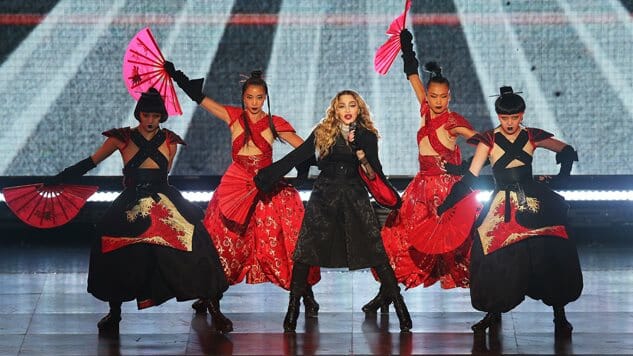The 10 Best Madonna Songs of the 21st Century
Photo by Graham Denholm / Getty Images
Some might argue that Madonna’s legacy as the Queen of Pop has been slipping in recent years. And how could it not? Just look at the horror show that is the Hard Candy cover, the blatant attempt to jump aboard the EDM bandwagon several years too late, among other examples. But the businesswoman/singer/humanitarian born Madonna Louise Ciccone has never wavered in her commitment to entertainment and performance. Her output just in the 21st century—including five studio albums and a six international tours—certainly proves it. So, to mark this week’s release of Madonna’s fifth live album, Rebel Heart Tour, we’re taking a look back at her finest songs of the past 17 years.
10. “Devil Wouldn’t Recognize You”
Its hideous cover aside, Madonna’s 11th album, Hard Candy, was a palatable attempt at full-blown R&B, masterminded by two of the genre’s heavyweights. But while Timbaland and The Neptunes’ futuristic production remained as slick as ever, it often reduced Madonna to sounding like a guest star on her own record. Co-written with Timbaland and his regular cohort, Justin Timberlake, “Devil Wouldn’t Recognize You” isn’t exactly Madonna’s most original offering—its acoustic riffs, kiss-off lyrics and brooding beats bear more than a passing resemblance to JT’s “What Goes Around Comes Around.” But the song’s quiet restraint gave Madonna a rare opportunity to take center stage, something that she fully grasped with an uncharacteristically vulnerable vocal, proving she isn’t always the steely superhuman.
9. “Ghosttown”
With a little more quality control, 2015’s Rebel Heart could have finished runner-up to Music as Madonna’s finest 21st century LP. But ultimately there were too many toe-curling attempts to get down with the kids (“Bitch I’m Madonna” being the guiltiest culprit) among its—uh—generous 19 tracks to merit such a status. However, it can still lay claim to hosting Madonna’s best single this decade. Cowritten with a team of powerhouse songwriters, “Ghosttown” could have been recorded by any number of divas half her age. But in an era when the production of her material appears to have taken precedence over melody, it was refreshing to hear her tackle something so immediately tuneful. Madonna sells the hell out of it, too, aping the melancholic tones of Karen Carpenter in the verses before belting out the “Us against the world” chorus like a woman on a mission.
8. “Don’t Tell Me”
Following her masterful reinvention on 1998’s Ray of Light, Madonna seemed to be growing older gracefully with a second straight album of exquisitely produced experimental pop. In fact, the entirety of 2000’s Music could be featured here (well, barring the “Beautiful Stranger” knock-off “Amazing” and vocoder-frenzied “Nobody’s Perfect”). Second single “Don’t Tell Me” was the immediate standout, its blend of stop-start folksy guitar riffs and producer Mirwais’s fractured beats perfectly complementing the campaign’s modern-day cowgirl imagery. Likewise, French composer Michel Colombier’s stunning strings on an elegiac finale were worthy of the most epic old-school Western.
7. “Impressive Instant”
With lyrics like “I like to singy singy singy / Like a bird on a wingy wingy,” “Impressive Instant” might not be Madonna’s most lyrically profound number or her most sophisticated vocal showcase. In fact, Mirwais drowns her nonsensical ode to love at first sight in so much vocoder that he almost makes Believe-era Cher sound human. But on an album filled with heartfelt introspection, the swirling mix of techno, acid house and trance proved that Madonna still possessed a sense of fun. As with her finest ‘90s club moment, “Ray of Light,” Music’s second track builds toward a thrilling crescendo of electronic bleeps, distorted synths and pulsing beats that temporarily make the world feel like it is indeed spinning out of control.
6. “Masterpiece”
Perhaps inevitably, Madonna’s second directorial effort, W.E., received the same dismal critical response that greeted the majority of her acting career. Nevertheless, it did receive an Oscar nomination for Best Costume Design and, thanks to this exquisite ballad about the film’s central character, socialite Wallis Simpson, a deserved Golden Globe for Best Original Song. A reunion with possibly her most inspired choice of collaborator, William Orbit, “Masterpiece” eschewed the textured electronica of Ray of Light in favor of a simple acoustic-led production harkening back to the love songs of her mid-’90s compilation, Something to Remember. If only the film it had accompanied had been so effortlessly graceful.
-

-

-

-

-

-

-

-

-

-

-

-

-

-

-

-

-

-

-

-

-

-

-

-

-

-

-

-

-

-

-

-

-

-

-

-

-

-

-

-








































